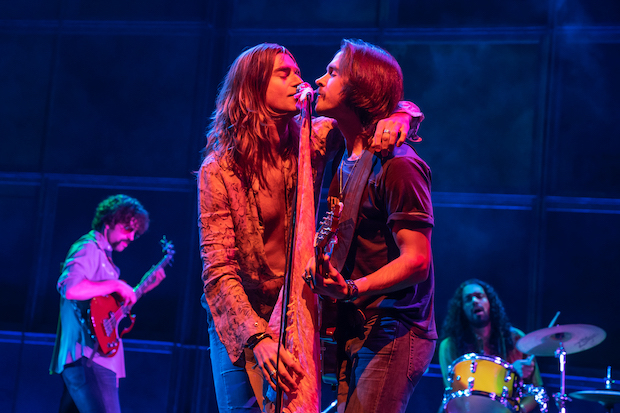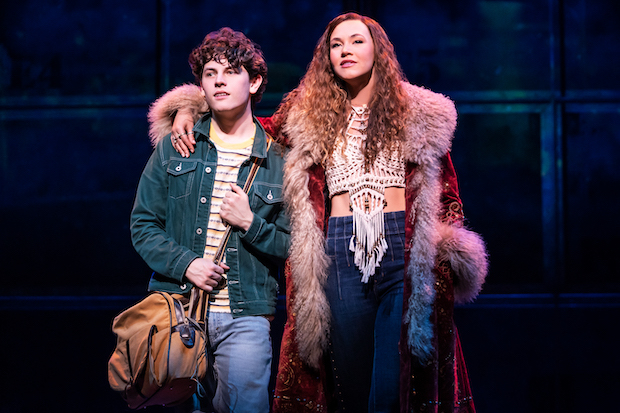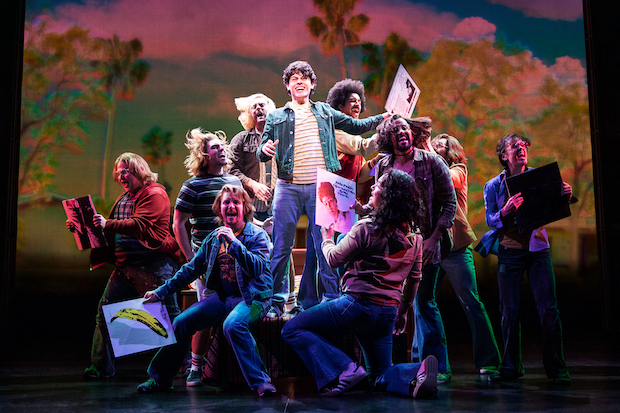Review: Almost Famous: The Musical Offers a Reason to Just Stay Home and Watch the Movie
The Tom Kitt-Cameron Crowe musical, adapted from Crowe’s beloved 2000 film, is now on Broadway.

(© Matthew Murphy)
It's become too easy to decry the preponderance of screen-to-stage adaptations on Broadway in recent years. But alongside even last season's Mrs. Doubtfire (which at least had a couple memorable bits of stage choreography) and Mr. Saturday Night (in which the spectacle of Billy Crystal telling jokes was enough to transcend middling singing voices and Jason Robert Brown on autopilot), Almost Famous: The Musical hits a new low. So bereft of anything resembling care, wit, and imagination is this Tom Kitt-Cameron Crowe musical that it may end up being memorable for a different reason: as an object lesson in how not to bring a beloved movie to the stage.
In Crowe's 2000 film of the same name, based on his own experiences as a rock journalist for Rolling Stone, William Miller (played in the musical by Casey Likes), falls into the orbit of both the rock band Stillwater — fronted by lead singer Jeff Bebe (Drew Gehling), but whose guitarist, Russell Hammond (Chris Wood), is its heart and soul — and their groupies, chiefly Penny Lane (Solea Pfeiffer), with whom the already attached Hammond carries on a fling.
Besides being a fond look back at the period in the 1970s when rock music was, according to legendary critic Lester Bangs (Rob Colletti), on the verge of being corrupted by mainstream acceptance, the film also depicted, with brutal honesty, the ethical minefields of being a music journalist. William, a precocious 15-year-old with an overprotective mother (Anika Larsen), finds himself becoming too involved with his subjects and the lure of maturity and rebellion they represent to him.

(© Matthew Murphy)
Crowe, who wrote the book for the new musical, has brought the plot and characters to the stage with near-slavish faithfulness, which means Almost Famous: The Musical may work for those who approach the show without any knowledge of the movie. However, there's a genuine sense of authenticity to the film, a feeling of Crowe looking back at a time he knows inside and out with both affection and critical distance, but that doesn't survive in this adaptation.
Some of the problem lies in the score itself. Despite being set in the world of rock 'n' roll, Kitt falls back on a generic-sounding musical-theater idiom for his songs, many of which are bound to dissolve from your memory as soon as they hit your ears. Tellingly, the only memorable musical moments are those in which Kitt appropriates existing rock tunes: David Bowie's "It Ain't Easy" for the moment when William loses his virginity; Joni Mitchell's "River" for an emotionally fraught moment involving Penny Lane; and, of course, Elton John's "Tiny Dancer" in an obligatory reproduction of the film's most iconic scene.
The inclusion of Stillwater songs from the movie also don't do Kitt's score any favors. Nor do the lyrics he and Crowe come up with, which range from blandly declamatory to try-too-hard embarrassing. Surely Lester Bangs himself would have spat on Russell and Penny's mutual declaration of love, in which they sing "the night-time sky's got nothing on you" to each other.
Jeremy Herrin's uninspired direction doesn't help. Instead of the lived-in exteriors seen in Crowe's film, we get chintzy-looking projections from designer Derek McLane. At least some of his video backdrops are colorful compared with McLane's scenic design, which is generally one humdrum backstage and hotel set after another. There is choreography credited to Sarah O'Gleby and Khadija Tariyan, but beyond one fairly inventive use of album covers in its opening "1973" number, there are no dance moves onstage that you haven't seen in other musicals. David Zinn's period costumes and Natasha Katz's arena-rock lighting design are utilitarian at best.

(© Matthew Murphy)
Some of the performers manage to shine amid the mediocrity. Solea Pfeiffer, making her Broadway debut, is the most successful at escaping the film's shadow, capturing Penny Lane's life-force innocence-masked-as-experience in ways that make you forget Kate Hudson's star-making turn in the film. Casey Likes, almost making his Broadway debut as William, isn't too far behind, coasting on wide-eyed charm. But as William's mother, Anika Larsen, for all her maternal warmth, can't quite efface memories of Frances McDormand in the part; and Chris Wood lacks the charisma Billy Crudup exuded as the relatively wiser and world-weary Russell.
Perhaps none of this will matter to the audience members who go into this musical already loving the film. With such an audience already built in, why bother expending any effort at rethinking or reimagining material to challenge them? Almost Famous: The Musical may well be the most dispiriting example of this screen-to-stage trend: a creatively bankrupt illustration of exactly the kind of commercialism that these characters rail against.









